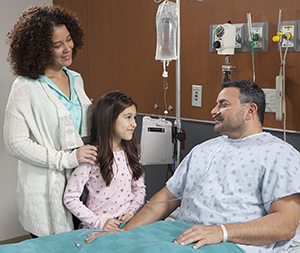After Surgery for Sleep Apnea
Some procedures for sleep apnea are done in the healthcare provider's office. Others are done in a hospital or outpatient surgery center. If you have a hospital procedure, you may stay 1 to 2 nights. Follow up with your surgeon after your procedure as directed.

Notes about surgery
Whatever kind of surgery you have for snoring or apnea, keep in mind:
-
There’s no guarantee that surgery will solve the problem. Surgery may sometimes stop snoring or apnea. But not both. You will need a follow-up sleep study. This is done to check the effects of your surgery. It's also done to help decide what further treatment you might need.
-
You may have more than one blockage. If so, you may need more than one procedure.
-
Surgery may be done with other kinds of treatment.
-
Any surgery has a chance of complications. This includes bleeding and infection.
Recovering from surgery
After surgery, your nose, throat, or jaw may be sore for a few days to several weeks. Full recovery may take weeks or months. You may need to eat only soft foods during this time:
-
Keep track of changes. You and your partner must both keep track of how your sleep and health are different now. What is better? How much better? Is anything worse? Consider keeping a dated log. Show this to your healthcare provider on your follow-up visits.
-
Air pressure adjustments. If you use continuous positive airway pressure (CPAP) after surgery, ask your surgeon when to start using it again after surgery. Keep your surgeon and other healthcare providers informed about how well CPAP is working for you. Have it adjusted if anything about it is uncomfortable.
-
Don't smoke. Don't smoke before or after surgery. Smoking reduces blood flow to the skin. It also slows wound healing. Nicotine from any source (cigarettes, e-cigarettes, patches, chewing tobacco) also slows healing. Join a stop-smoking program to improve your chances of success.
Online Medical Reviewer:
Andrew D Schriber MD
Online Medical Reviewer:
Marianne Fraser MSN RN
Online Medical Reviewer:
Tara Novick BSN MSN
Date Last Reviewed:
7/1/2022
© 2000-2024 The StayWell Company, LLC. All rights reserved. This information is not intended as a substitute for professional medical care. Always follow your healthcare professional's instructions.